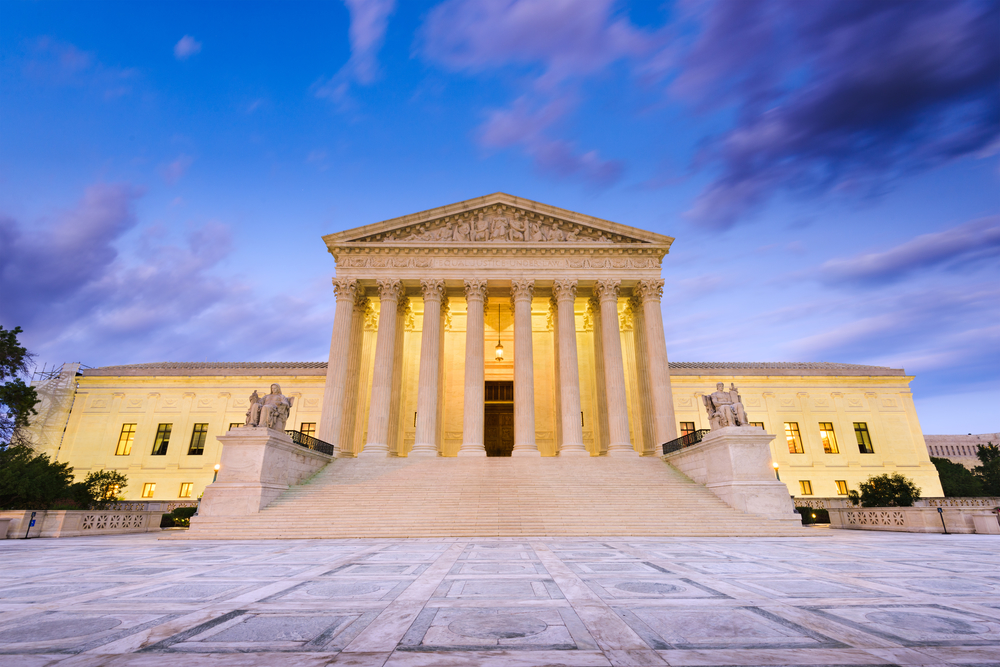
By: Aimee Christianson and Shaloni Pinto
{Read in 4 minutes} On June 3, 2019, the Supreme Court released their decision in the case Fort Bend County v. Davis [No. 18-125], which involves Equal Employment Opportunity Commission (EEOC) claim filing disagreements. This case involves Title VII of the Civil Rights Act of 1964 and a potential complainant’s administrative requirements with the EEOC.Continue reading
Employment Overwatch: The EEOC
 {Read in 5 minutes} In my previous post, I wrote about the impact an impending Supreme Court decision may have on employee protections — particularly LGBT employees. The issue is whether or not sex discrimination as prohibited by Title VII includes sexual orientation or gender identity protections for employees. While the Equal Employment Opportunity Commission (EEOC) has consistently found that it does, District and Circuit Courts have differed on the matter, and the Supreme Court will rule on the issue in their next term. Continue reading
{Read in 5 minutes} In my previous post, I wrote about the impact an impending Supreme Court decision may have on employee protections — particularly LGBT employees. The issue is whether or not sex discrimination as prohibited by Title VII includes sexual orientation or gender identity protections for employees. While the Equal Employment Opportunity Commission (EEOC) has consistently found that it does, District and Circuit Courts have differed on the matter, and the Supreme Court will rule on the issue in their next term. Continue reading
Interpreting Title VII
 {Read in 4 minutes} When I was in law school 20 years ago, I wrote an article on legislation before Congress referred to as the Employment Non-Discrimination Act or “ENDA.” This legislation was aimed at expanding Title VII’s coverage to specifically include sexual orientation and gender identity as protected categories not specifically provided by Title VII.
{Read in 4 minutes} When I was in law school 20 years ago, I wrote an article on legislation before Congress referred to as the Employment Non-Discrimination Act or “ENDA.” This legislation was aimed at expanding Title VII’s coverage to specifically include sexual orientation and gender identity as protected categories not specifically provided by Title VII.
Title VII is part of the original Civil Rights Act federal law enacted in 1964 which provides employees protection from discrimination because of race, national origin, and gender. Over the years, the law was expanded to include some protections for those over the age of 40 and the disabled, and is the bedrock of civil rights law in the employment environment.
To this day, the ENDA legislation has not been passed and there are no specific federal laws that prohibit discrimination based on sexual orientation or gender identity. Moreover, Title VII has not been amended to include these additional specific categories (despite other expansions). It is a sad commentary on our country, and our politics, that in 20+ years, we could not get our act together to provide the specific protections many working citizens require.
Despite this hurdle, the Equal Employment Opportunity Commission (EEOC), the watchdog agency empowered to enforce Title VII, has interpreted Title VII to protect against discrimination on account of sexual orientation and gender identity.
In fact, the EEOC has consistently interpreted any act of discrimination on account of these factors to be something that is covered by sex/gender discrimination. This means you are protected if:
- You don’t conform to sexual or gender stereotypes
- You identify as a different gender than the gender you may appear to be or were born
- You have a different sexual orientation or prefer sex that doesn’t conform with the popular notion of what a man or a woman should be
- Trans workers who don’t fit the form of what is considered to be the gender norms of society
The EEOC has been granted broad discretion to resolve disputes but unsettled legal issues still have to be resolved, by and large, in court — and federal courts have differed. Some circuits agree with the EEOC’s interpretation that sexual orientation falls under Title VII sex discrimination,while others have found that it does not.
Whenever you have circuit court splits like this, the issues become ripe for the Supreme Court — which can either agree to take up the issue or decline to take up the case(s) that address the conflict between the circuits. Recently, it was announced that the Supreme Court will take up this issue in the next term.
This is going to be a big, big decision. Obviously, we have a different Supreme Court makeup today than we did a few years ago, but this is an issue that has gained a lot of popularity and a lot of momentum legally, politically and socially.
The decision will have a huge impact on the landscape of workplace discrimination. The Supreme Court will determine whether Title VII is essentially expanded to include sexual orientation and gender identity as protected classes thereby making it the law of the land. If they find that Title VII does not provide such protection, it will permit employers, to a degree, to discriminate on account of sexual orientation and gender identity.
LGBT workers would have to turn to state and local laws for protection should the Supreme Court limit the law. Many states, such as New York, have laws that protect the LGBT community working in the state. Many states, sadly, have not extended such protections to members of the LGBT workforce.
Things take time, but this decision will be here before we know it. It is something that will have a huge impact on employee protections in the workplace — and could set back a lot of work and progress that has been made so far by the EEOC and the lower district courts who have upheld the EEOC’s interpretation of the law.
James A. Vagnini
Partner
email: jvagnini@vkvlawyers.com
Workplace Discrimination? Get that Complaint Filed!
Employees in this country have protections against workplace discrimination and harassment. These include protection from sexual or racial harassment, national origin, religion, age, disability, and gender (including sexual orientation) discrimination. These forms of harassment and discrimination are spelled out under Title VII, and its amendments, which is the statute enacted as a result of the Civil Rights Act of 1964.

Prior to that time, there had been other federal statutes such as §1981 and §1983 which address primarily race and national origin discrimination as well as retaliation. These sections, however, did not include gender, religion, disability, or age discrimination. As a result of the civil rights movement, the Civil Rights Act was passed, which was designed to specifically address workplace discrimination and expanded protections for employees subjected to these additional types of discrimination.
The Title VII statute empowered what is known as the Equal Employment Opportunity Commission (EEOC) and created that faction of the government whose job it is to survey and take complaints of workplace discrimination. Anyone wanting to bring a complaint and go into Federal court under those claims has to first go through the EEOC administrative process. As a federal statute, it is the same in every state and any employer who has 15 employees or more is subject to the statute.
The EEOC Filing Deadline
Title VII sets a complaint filing deadline of 180 calendar days. However, it also provides that in any state where there is a similar employment discrimination statute, such as New York, the deadline may be expanded to 300 days. With the exception of a few states like New Mexico and Georgia, every state in this country has a state-level statute against workplace discrimination. In those states that do not, the filing period is limited to the 180 days.
A complaint must be initiated when the harm takes place. You can’t have something happen two years earlier and then wait, worrying whether you are going to lose your job. That is certainly a legitimate worry, but if you choose to wait and try to raise that complaint after the 180-300 days have passed, it will be considered untimely because the statute requires you to make that complaint within 180-300 days of the occurrence of discrimination.
However, certain claims trigger the 180-300 day filing requirement after the last occurrence of discrimination where the discrimination takes place over a period of time. This type of discrimination is known as a “continuous violation.” For example, if you are a victim of sexual harassment and you were subjected to repeated, unwanted sexual advances or comments over a period of months, the clock starts running from the last act of harassment, not the first. Most employees do not know this.
If you believe you have a legitimate complaint, it is extremely important that you make use of resources like the EEOC’s website, or contact a lawyer like us to ask for information about what to do, even if you choose not to act on it at that time. Failing to act in many states leaves you high and dry, without any other protection, because either there is no state statute, or in more conservative jurisdictions like Texas, for example, the states only adopt the same 180-day rule as Title VII.
Paying attention to the EEOC deadlines is an important issue because an employee may have a very strong legal claim but if they do not act within a certain period of time, or get the information to act within a certain period of time, their claim may be completely barred leaving you with no avenue for justice.
James A. Vagnini
Partner
email: jvagnini@vkvlawyers.com
North Dakota workplace discrimination trial set for 2019
A racial discrimination lawsuit brought by six workers on a North Dakota job site is set for trial in late 2019. Continue reading
Hanging Monkey, Racial Graffiti, Among Evidence in Harassment Lawsuit
A stuffed monkey hanging from the ceiling in the shipping department at Univar USA’s Dallas distribution chemical facility is part of the evidence two Dallas men are providing in their lawsuit alleging racial harassment by some co-workers.
Continue reading
$4M Settlement Awarded in Sara Lee Discrimination Case
Federal attorneys with the Equal Employment Opportunity Commission today announced a $4 million settlement for former workers at the now closed Sara Lee factory in Paris.
The settlement is said to be the largest in the history of the EEOC in Dallas involving a hostile work environment.
This past Febuary, the EEOC released its findings, the results of a two year investigation into complaints.
It found violations of civil rights, that black employees suffered intimidation, racial taunts such as being called the ‘N’ word, and graffiti, and were steered into hazardous areas of the plant, exposing them to toxic materials.
More than two dozen workers from the now-shut down baking factory are part of the federal lawsuit.
Sara Lee, now a subsidiary of Tyson, sent CBS11 a statement saying in part they’re “committed to treating team members with dignatiy and respect and have a policy against harassment and discrimination.”
While the company says it doesn’t agree with all of the allegations in this case, it believes it makes sense to resolve this matter.
– Originally published in CBS DFW
Read original article from CBS DFW
The EEOC and Sara Lee: A Landmark Discrimination Case in Texas
After a two year investigation into complaints of civil rights and health violations, the Equal Employment Opportunity Commission (EEOC) announced a $4 million settlement for former employees at the Sara Lee factory located in Paris, Texas. This case marks the largest settlement in EEOC history involving a hostile work environment. The EEOC took on the case after twenty-five workers filed complaints against the company during their time at the now-shuttered factory, which closed in 2011. Attorneys now estimate that over seventy employees stand to benefit from the settlement. In addition to financial reparations, the company will be required to implement measures to prevent workplace discrimination and to submit regular reports to the EEOC. Read on for a look inside the landmark case.
THE ALLEGATIONS AGAINST SARA LEE
The EEOC’s two year investigation found that black employees were targets of intimidation and were denied promotions that went to their white peers. Black employees reported racial slurs and graffiti during their time at the factory, incidents which were corroborated by the EEOC. A lawsuit filed separately from the EEOC complaint revealed that the graffiti included racial slurs, threats, and crude drawings of apes and black men with nooses. A large portion of the alleged abuse came from white supervisors within the factory and several Sara Lee officials have been accused of ignoring complaints from black employees about the conditions within the factory. In addition, workers were reportedly exposed to black mold asbestos and other toxins during their daily work. The working conditions were so hazardous that:
One of the cake lines was nicknamed the ‘cancer line,’ because so many people were getting sick, said Sara Kane, one of the workers’ attorneys, of the law office Valli, Kane & Vagnini.
According to the investigation, black employees were exposed to these conditions while their white colleagues were promoted to positions located in safer areas of the factory. These white employees were allegedly often less-experienced than their black co-workers but they received promotions nevertheless.
According to the EEOC’s report, several black employees contracted cancer and other diseases as a direct result to their exposure to toxins in the workplace. When black employees reported their diseases to management, their complaints were either ignored or dismissed as being unrelated to working conditions within the factory. The closure of the factory in 2011 meant that the EEOC had relatively limited exposure to the physical conditions of the factory, so the investigation did rely heavily on interviews with employees.
THE ROLE OF THE EEOC
The EEOC enforces federal laws against discrimination in most companies with 15 employees or more (although this can vary according to certain jurisdictions and circumstances). The EEOC processes both private sector and federal sector violations of discrimination laws, although it takes a more active investigative role in private sector cases. There are two distinct private sector and a federal sector mediation programs, which each offer dispute resolution with EEOC cooperation. If conciliation cannot resolve a private sector dispute, the EEOC has the right to pursue litigation and also has a right to participate in an ongoing lawsuit. According to the EEOC website,
The EEOC has the authority to investigate charges of discrimination against employers who are covered by the law. Our role in an investigation is to fairly and accurately assess the allegations in the charge and then make a finding. If we find that discrimination has occurred, we will try to settle the charge. If we aren’t successful, we have the authority to file a lawsuit to protect the rights of individuals and the interests of the public. We do not, however, file lawsuits in all cases where we find discrimination.
The EEOC may handle tens of thousands of complaints every year, but they very rarely escalate to the heights that the Sara Lee case has, which makes the future of Sara Lee critically important. If Sara Lee complies with the EEOC regulations and actively changes its workplace environment in the coming years, it will serve as a model for other companies that have had large-scale reports of discrimination. The successful transformation of the Sara Lee case will lie with its parent company–Tyson Foods.
A NEW NAME AND A NEW BRAND
In 2012, so chronologically after the alleged abuse occurred, Sara Lee went through a major re-branding, effectively splitting the business in two. The food side of the business was labeled Hillshire Brands while the tea and coffee end of the company (centered in Europe) was named D.E. Master Blenders 1753. The name change was speculated to have been prompted by lackluster sales of meat products.
In 2014, Hillshire Brands completed a merger with Tyson Foods, Inc. which The Wall Street Journal referred to as the “meat industry’s biggest deal.” After the merger, Hillshire’s chief executive Sean Connolly stepped down, clearing the way for new leadership. However, the Sara Lee discrimination case did not disappear with the name change. Although headlines associate the case with Sara Lee, Tyson is now liable for the settlement and for rebuilding the brand’s image in the wake of the EEOC investigation. In an interview with Buzzfeed News, Tyson Foods spokesperson Worth Sparkman said the company is
‘Committed to treating our team members with dignity and respect and have a policy against harassment and discrimination,’ noting Tyson Foods requires annual training and offers a toll-free help line for workers to report any concerns without fear of retaliation. ‘While we don’t agree with all of the allegations in this case, we oppose any unlawful discrimination in the workplace and believe it makes sense to resolve this matter,’ Sparkman wrote in an email. When asked which allegations the company disagrees with Sparkman said, via email, ‘We’ll point out that any alleged conduct in this case occurred before portions of Sara Lee were acquired by Tyson Foods in 2014.’
The Tyson brand has also had a series of legal skirmishes over working conditions over the past few years. This November, the Supreme Court heard a case against Tyson in which employees argued that Tyson unlawfully failed to pay for the time it took them to put on and then remove safety equipment during their daily tasks. In a lower court, employees were awarded half of what their counsel requested. The case has raised interesting questions about collective action lawsuits, as the case involves more than 3,000 workers in total: Should that many employees be allowed to file their complaint at one time, in a single case?
The Supreme Court has approached the case less as an issue of wage violations and more as a debate over what the threshold should be for the number of participants in a collective action lawsuit. Yet, if the Supreme Court rules in favor of the employees, Tyson may pay out even more than they did in the Sara Lee case–approximately $6 million.
CONCLUSION
The Sara Lee case is a unique one in that a significant number of workers were courageous enough to file complaints and patient enough to wait for the legislative process to work over several years. Not every discrimination case is investigated by the EEOC, either because there is not sufficient evidence or because victims do not feel safe reporting misconduct. Hopefully, the Sara Lee case will inspire other companies to enact preventative measures to disband discrimination. The EEOC has delivered a decisive victory for the employees of the Texas factory, we’ll have to see what effects it might have in future discrimination cases.
– Staff Writer Jillian Sequeira, Law Street Media
Read original article in Law Street Media
EEOC: $4M settlement sends message that work discrimination won’t be tolerated
Federal attorneys with the Equal Employment Opportunity Commission said Tuesday that a $4 million settlement for former workers at the now closed Sara Lee factory in Paris, Texas, sends a message to employers that workplace discrimination and dangerous work environments won’t be tolerated.
Black employees suffered intimidation, racial taunts including being called the ‘N’ word, and racist graffiti on the walls of bathrooms and the locker room at the plant in Paris, Suzanne Anderson, supervisory trial attorney with the EEOC, said at a news conference outside the federal courthouse in Dallas. In addition, the former bakery employees were required to work in hazardous areas of the plant, exposing them to toxic materials, she said.
Sara Wyn Kane, a New York attorney who represented the clients in the lawsuit, said the takeaway for employers is that it’s never acceptable to treat people differently based on the color of their skin, nor is it acceptable to allow others to do so. She said that job site discrimination and harassment continues to be a significant problem at large and small companies nationwide.
“As an employer, you have an obligation to make sure that people can come to work free of discrimination, and free of fearing for their health and safety,” Kane said. “If you see that or learn about it, you need to stop it as an employer. You can’t sit back and hope it goes away or think that it’s OK.”
The settlement is the largest in the history of the EEOC in Dallas involving a hostile work environment.
Let the Mother Beware: Pregnancy in the Workplace

It is somewhat hard to believe in this day and age that women experiencing pregnancy in the workplace are still being subjected to workplace policies that put their livelihood in jeopardy. Despite federal laws dating back to the Civil Rights Act of 1964 and several updates and addendums, there are still employers in the United States that have written policies that terminate workers due to pregnancy, regardless of the ability to perform that job’s duties and the overall physical capabilities of the workers.
A recent case in point was brought by the EEOC against a Baytown, Texas, restaurant chain called Bayou City Wings. Acting on behalf of a former employee named Maryann Castillo and eight other dismissed workers, the EEOC claimed that Bayou City Wings, and its parent company, JC Wings Enterprises, LLC, operated with a discriminatory policy against their workers who were experiencing pregnancy in the workplace. Their written policy mandated laying off workers after their third month of pregnancy, regardless of the employees’ desire and ability to stay on the job. In this case, Castillo was not experiencing any difficulties performing her job duties and had received approval from her doctor to work up to her 36th week of pregnancy.
Despite the honorable desire of the employer to take responsibility for the well-being of the unborn babies in these cases, it is important to note that the law and previous Supreme Court cases have determined that it is not the responsibility of employers to make decisions to protect the well-being of the unborn children of their employees, but rather the sole responsibility of the mothers involved. For employers, this could be a release of guilt if a mother’s decision to work jeopardizes her unborn child. The true benefit for this is that the women carrying their children should be able to have control over what they can or cannot do, without the arbitrary decisions of companies that are driven by the bottom line.
The EEOC cannot be the only protector of these cases of injustice and discrimination in the workplace. It is important for all employees, and especially women, to know their rights in a situation where they are facing a pregnancy in the workplace. Under the laws of this country, mothers-to-be are protected and have the law on their side. The Law offices of Valli, Kane, and Vagnini are specially equipped to help any victim of this or any other kind of discrimination in the workplace. Contact them for a free consultation to make sure that your rights are protected.





